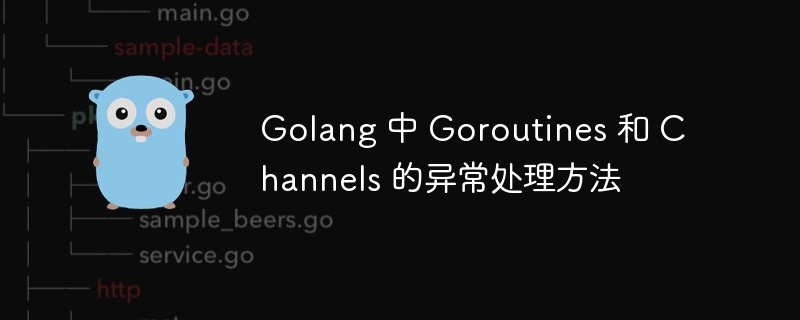

Exception handling methods of Goroutines and Channels in Golang
In Golang, Goroutines and Channels are very powerful concurrent programming tools. Goroutines are lightweight threads that can execute multiple Goroutines at the same time and can be dynamically created and destroyed while the program is running. Channels are used for communication between Goroutines, which can achieve safe transmission and synchronization of data. However, when exceptions occur in Goroutines and Channels, we need to take some measures to handle the exception to ensure the stable operation of the program.
1. Goroutines’ exception handling
In Golang, Goroutines will not throw exceptions by default, nor will they end automatically. Therefore, if an exception occurs in a Goroutines, the program will not crash, but will continue to execute the code of other Goroutines or the main thread. This mechanism ensures the stability and reliability of the program to a certain extent, but it also brings some problems. If an exception occurs in Goroutines and is not handled, the exception will be ignored, which may cause logic errors in the program or incorrect data processing. To solve this problem, we can use defer and recover inside Goroutines to catch and handle exceptions.
package main
import (
"fmt"
)
func main() {
go func() {
defer func() {
if err := recover(); err != nil {
fmt.Println("Exception caught:", err)
}
}()
// 在 Goroutines 中发生异常
panic("goroutine error")
}()
// 主线程继续执行其他代码
fmt.Println("Main thread continues...")
}In the above example, we use defer and recover inside Goroutines to catch exceptions. When a panic occurs in Goroutines, it will be caught by defer and the exception information will be printed. This way you avoid program crashes and can continue executing other code in Goroutines.
2. Exception handling of Channels
In Golang, Channels are an important tool for communication between Goroutines. When we use Channels to send and receive data, exceptions sometimes occur, such as sending data to a channel again after it has been closed, or trying to receive data from a closed channel. These operations will trigger exceptions. In order to avoid program crashes and incorrect data handling, we need to handle exceptions in coding.
package main
import (
"fmt"
)
func worker(id int, jobs <-chan int, results chan<- int) {
for j := range jobs {
// 处理任务
fmt.Printf("Worker %d is processing job %d
", id, j)
// 模拟异常情况
if j == 3 {
fmt.Printf("Worker %d encounters an exception
", id)
// 人为造成的异常,向已关闭的 results 通道发送数据
results <- 10
} else {
// 处理完成后将结果发送到 results 通道
results <- j * 2
}
}
}
func main() {
jobs := make(chan int, 10)
results := make(chan int, 10)
// 启动多个 Goroutines 来处理任务
for w := 1; w <= 3; w++ {
go worker(w, jobs, results)
}
// 发送任务到 jobs 通道
for j := 1; j <= 5; j++ {
jobs <- j
}
close(jobs)
// 从 results 通道接收返回值
for a := 1; a <= 5; a++ {
if r, ok := <-results; ok {
fmt.Printf("Result: %d
", r)
}
}
}In the above code example, we started three worker Goroutines to handle tasks. In the worker Goroutines, when j equals 3, we deliberately let it send data to the closed results channel, causing an exception. In order to handle this exception, we used the if statement and the channel's receive operation ok to capture and handle the exception. When the exception occurs, the program will not crash and we can continue to receive data sent by other Goroutines.
When using Channels for concurrent programming, we need to carefully handle exceptions that may occur to ensure the reliability and stability of the program. By rationally using the exception handling methods of Goroutines and Channels, we can better control the concurrent execution of the program and improve the quality and performance of the program.
Through the introduction of the exception handling methods of Goroutines and Channels in Golang, I believe that readers will have a clearer understanding of how to handle exceptions in concurrent programming, and can also flexibly apply these methods to handle exceptions in practice. Improve program stability and reliability.
The above is the detailed content of Exception handling methods for Goroutines and Channels in Golang. For more information, please follow other related articles on the PHP Chinese website!
 How to define variables in golang
How to define variables in golang
 What are the data conversion methods in golang?
What are the data conversion methods in golang?
 What are the commonly used libraries in golang?
What are the commonly used libraries in golang?
 What is the difference between golang and python
What is the difference between golang and python
 geforce 940mx
geforce 940mx
 Interview assessment tools
Interview assessment tools
 What does ping mean?
What does ping mean?
 You need permission from admin to make changes to this file
You need permission from admin to make changes to this file
 ORACLEDISTINCT
ORACLEDISTINCT




